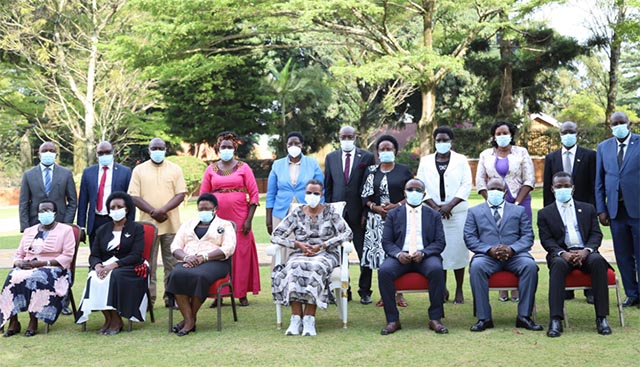
Kampala, Uganda | THE INDEPENDENT | Reforms are in the pipeline to expand Technical and Vocational Education and Training (TVET) institutions and increase access and equity in its programs, particularly for disadvantaged groups.
The Government intends to promote private sector engagement, and also improve governance and coordination among stakeholders in a sweeping overhaul of the TVET sector that Uganda’s Minister of Education and Sports Janet K Museveni believes will revitalize the country’s economy, and address soaring youth unemployment.
“The TVET sector has the potential to drive economic growth and reduce poverty,” said Janet K. Museveni, also Uganda’ s First Lady, as she released the Uganda Business Technical Examinations Board (UBTEB) results for July/August 2024.
“These reforms will ensure our youth acquire the skills needed to compete in the global market.”
The reforms focus on industry-led training, curriculum strengthening, and teacher training. Uganda’s TVET overhaul aligns with global recognition of the sector’s potential in addressing poverty and youth unemployment.
The First Lady also announced plans to upgrade and expand TVET institutions, making them more accessible and affordable for citizens.
Under this arrangement, the education Minister said government will modernize infrastructure and equipment in current TVET institutions to enhance the quality of training.
Additionally, new TVET institutions will be built, expanding access to vocational training nationwide.
To make TVET programs more affordable, the government will allocate additional resources to support them.
TVET graduates will possess skills tailored to industry needs, boosting their employability prospects. A skilled workforce will contribute to Uganda’s economic development and competitiveness,” the minister announced.
Currently, Uganda has 41 Community Polytechnics and Technical Schools, 84 Vocational Training Institutes, and 21 technical colleges.
According to the released exams results, TVET sector has recorded a significant milestone, with female completion rates reaching an impressive 84%. This achievement is attributed to the government’s introduction of special scholarships and a decentralized admission system.
“The 84% completion rate for female TVET students is a testament to the effectiveness of our special scholarships and decentralized admission system,” Minister Museveni said. “We’re committed to empowering Ugandan women with the skills needed to succeed in the workforce.”
The special scholarships, introduced in the 2022/2023 financial year, target females and Special Needs Education learners pursuing courses in “scarce skills” such as mechanical engineering, road construction, automotive mechanics, and architecture. The decentralized admission system allows students to apply to TVET institutions closer to their residences, increasing accessibility.
Dr. Kedrace Turyagyenda, the Permanent Secretary of the Ministry of Education and Sports emphasized the importance of TVET providers focusing on training with production, transferring innovative and entrepreneurial skills to trainees.
“We urge TVET trainers to stay updated with industry trends by returning to the industry at least once a year,” she said. The Ministry is also digitalizing TVET processes, registering providers on the TVET Management Information System (TMIS) for improved planning and coordination.

Dr. Eng. Silver Mugisha, Board Chairperson of UBTEB emphasized the need for the government to prioritize the development of the TVET Qualifications Framework which he said provides a basis for standards in training, assessment, and qualifications.
“The TVET Qualifications Framework is crucial for ensuring our training programs meet industry needs,” Dr. Mugisha explained. “We urge the government to support its development.”
Dr. Mugisha also requested the government to upgrade training facilities, equipment, and human resources in TVET institutions. This upgrade, he said would enable institutions to provide hands-on skills training, equipping students with practical skills.
The UBTEB chairman highlighted the importance of completing the Assessment Centre Project. Currently, the project is 78% complete, with a funding gap hindering its completion by February 2025.
“We appeal to the government to address this funding gap,” Dr. Mugisha said. “The Assessment Centre Project will enhance our examination processes and improve the quality of TVET assessments.”
UBTEB has achieved notable milestones under Dr. Mugisha’s leadership. The Board has achieved International Organization for Standardization (ISO) Certification, demonstrating its commitment to global standards.
UBTEB has also enhanced its Examination Information Management System (EIMS), allowing online registration fee payments and result processing. Plans are underway to roll out online certification and verification of awards.
The Board has implemented Continuous Professional Development for Assessors, ensuring they remain updated on industry trends. UBTEB has also fostered partnerships with industries to ensure training programs remain relevant.
UBTEB Executive Secretary Onesmus Oyesigye noted that 82% of candidates successfully completed their programs, with 15% scoring Class I (Distinction), 57% Class II (Credit), and 9% Class III (Pass) grades.
Oyesigye commended the performance of female candidates, who outperformed males in National Diploma programs.
He also highlighted the success of Uganda’s TVET program, citing a 2023 tracer study that showed 82% of TVET graduates from 2016-2019 found employment.
However, Oyesigye acknowledged challenges in Technical Diploma programs, particularly in subjects like Thermodynamics, Computer-Aided Design, Engineering Surveying, and Engineering Mathematics.
“To address these challenges, we require financial support for implementing the TVET Policy 2019,” Oyesigye explained. “Additionally, we need an expedited curricula review for trainees with special needs, early industrial training placement, and partnerships between training institutions and the workforce.”
Oyesigye further emphasized the importance of strengthening training delivery in specific modules to improve candidate performance.
“We must work together to provide high-quality vocational education,” Oyesigye said.
 The Independent Uganda: You get the Truth we Pay the Price
The Independent Uganda: You get the Truth we Pay the Price


